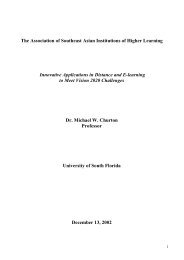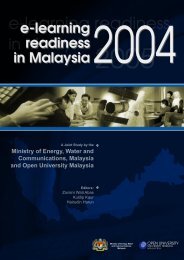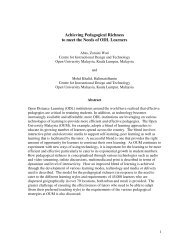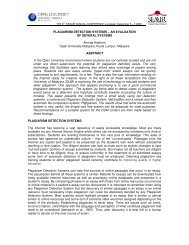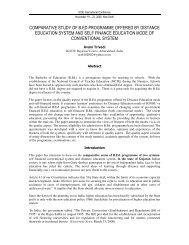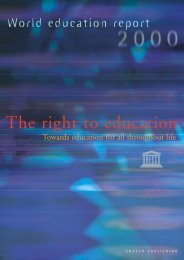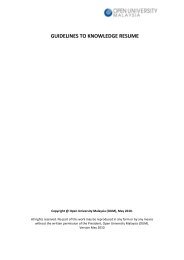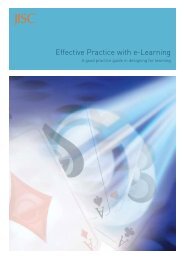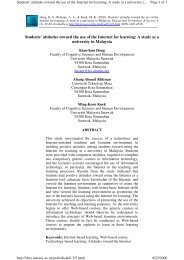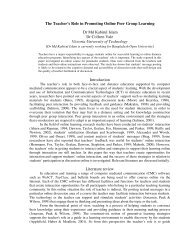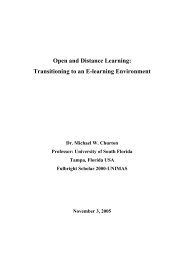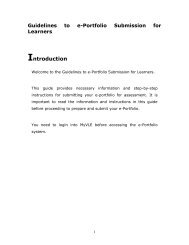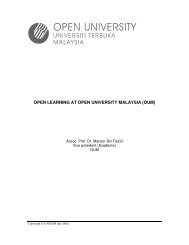<strong>higher</strong> <strong>education</strong>, including virtual <strong>education</strong>. The third aim was to capitalise on ICTfor effective, user-friendly advisory, guidance, <strong>learning</strong> material, administrative <strong>and</strong><strong>education</strong>al services.The plan is in line with the Bologna Declaration of 19 June, 1999, a joint declarationof the European ministers of <strong>education</strong>, which aims at establishing a European area of<strong>higher</strong> <strong>education</strong> by 2010. The process is co-ordinated by the Bologna Follow-up Group(www.bologna-bergen2005.no/). This area is intended to promote the mobility of people,the transparency <strong>and</strong> recognition of qualifications, the quality <strong>and</strong> European dimension of<strong>higher</strong> <strong>education</strong>, <strong>and</strong> the attractiveness of European institutions to third country students.The FVU is one means of facilitating virtual mobility. Finl<strong>and</strong> has ratified the Conventionon Recognition of Qualifications concerning Higher Education in the European <strong>Region</strong>,drawn up by the Council of Europe <strong>and</strong> UNESCO in April 1997.Organisation <strong>and</strong> funding of the Finnish Virtual UniversityThe Finnish Virtual University (FVU) is a consortium of all the Finnish universities.In addition to the 20 universities in the Ministry of Education sector, the Consortiumincludes the National Defence College, administered by the Ministry of Defence. TheConsortium Agreement was signed on 18 January, 2001.The decision-making body in the FVU is the Consortium Assembly, which is composedof one representative from each member university <strong>and</strong> one from the Ministry ofEducation. The universities are mostly represented by rectors or vice rectors. TheConsortium has one or two meetings per year. The agendas are drawn up by the FVUSteering Group, which also exercises authority between meetings. The Steering Groupcomprises five members nominated by the Consortium Assembly, one nominated by theMinistry of Education, <strong>and</strong> the director of the FVU Service Unit. There are also expertmembers, including representatives of Centre for Scientific Computing, the NationalUnion of Students in Finl<strong>and</strong> <strong>and</strong> the National Electronic Library. Besides participating innational collaboration, each member university has a special unit to promote <strong>and</strong> supportonline <strong>learning</strong> <strong>and</strong> teaching locally.The financing allocated by the Ministry of Education to universities during the three-yearagreement period provides the actual core funding, which amounts to some 87 per cent ofthe operational expenditure. The remaining 13 per cent constitutes financing of nationaltasks <strong>and</strong> programmes. The national programmes covering several years, initiated by theMinistry of Education, derive from the government programme, the Development Planfor Education <strong>and</strong> Research or the Ministry’s own resolutions. The Virtual University isone of the national priority programmes in the period 2000-2006.The funding of Virtual University activities is determined in the performance agreementsseparately concluded between the Ministry of Education <strong>and</strong> each university. TheMinistry of Education has financed virtual university projects since 2001, when the totalannual volume of the funding was €8.4 million. In 2005, the total is €9 million. Half ofthe funding is given to universities in proportion to their size for virtual teaching projectsprioritised by each university <strong>and</strong> for staff-development training. The other half is givento the Virtual University networks.Operational ideaThe operational idea of the Finnish Virtual University is that the universities provideservices that enable students to find flexible ways to study <strong>and</strong> help the university staff110
to make the best use of new <strong>education</strong>al technologies. New technologies are also used topromote nation-wide networking among subject fields <strong>and</strong> projects of common interest.Another factor facilitating student mobility is an agreement on flexible study rights.In 2004 all the Finnish universities signed a Flexible Study Rights (FSR) Agreementin order to enlarge study opportunities, increase study options <strong>and</strong> promote progressin studies. This agreement enables undergraduate <strong>and</strong> postgraduate students to includestudies offered by other universities in their degrees <strong>and</strong> avail themselves of the experts<strong>and</strong> specialities on offer in other universities. Before students start their FSR studies,their own university must approve the studies <strong>and</strong> the target university has to admit thestudent to the course. The student must be registered as being present at his or her homeuniversity. The target university describes the assessment scale <strong>and</strong> the home universityadjusts the grade to its own scale. FSR studies are free of charge for the student, but thehome university pays for the studies to the target university. If for some reason the homeuniversity does not do so, the student can take the course as a non-degree student. Thenon-degree study system is also open to those who are not enrolled at any university. Afee is charged for non-degree studies.The FVU offers courses “owned” <strong>and</strong> organised by the universities themselves or by thenetworks, which are consortiums of several universities or faculties. For virtual studies,the student has to be enrolled in one of the member universities. The FVU itself does notaward degrees or diplomas; this is always done by the member universities.FVU NETWORKSThere are three kinds of networks in the Finnish Virtual University. One form is anacademic network serving a specific discipline or a multidisciplinary field, whichproduces <strong>and</strong> offers courses in its field for undergraduate students <strong>and</strong> some of them alsofor postgraduate students. The second form is a regional network that produces onlinestudies <strong>and</strong> teaching geared to a given region <strong>and</strong> develops innovative regional conceptsin the use of ICT in local universities. The third type of network produces supportservices both for internal use in universities <strong>and</strong> for shared use among the universitiesthroughout the country. These services are developed by the support networks <strong>and</strong> madeavailable by the FVU Service Unit in the FVU portal.The academic <strong>and</strong> regional networks also organise joint courses, which are primarilyintended for the students of the member universities but also open to other students. Theuniversities offer many courses for students who are not enrolled in a university, such asupper secondary school students <strong>and</strong> open university students. Studies are free of chargefor regular undergraduate students, but the open university system charges fees.Academic networksAn example of an academic network is the University Network for CommunicationSciences. It is a national partnership between the relevant departments in ten <strong>higher</strong><strong>education</strong> institutions <strong>and</strong> has its own organisation for internal decision-making.The purpose of the network is to facilitate scientific co-operation <strong>and</strong> knowledge transferin the field of communication, to enhance basic studies in the field, especially with thehelp of ICT, to support doctoral <strong>and</strong> postdoctoral studies <strong>and</strong> to plan new programmes.In the academic year 2004-2005, it focuses on shared online courses, the ProfessionalLicentiate Programme in Digital Communication <strong>and</strong> joint postgraduate <strong>education</strong>.111
- Page 1 and 2:
PERSPECTIVES ONDISTANCE EDUCATIONLi
- Page 3 and 4:
The Commonwealth of Learning (COL)
- Page 5 and 6:
ACKNOWLEDGEMENTSIn addition to the
- Page 7 and 8:
These are some of the issues that a
- Page 9 and 10:
What are the trends and issues in l
- Page 11 and 12:
of policy implications relating to
- Page 13 and 14:
evince important differences that c
- Page 15 and 16:
inequitable regulations governing t
- Page 17 and 18:
associations and groups of countrie
- Page 19 and 20:
THE CONTRIBUTORChristopher McIntosh
- Page 21 and 22:
INTRODUCTIONIn his 1996 report to U
- Page 23 and 24:
Lastly, our analysis of the situati
- Page 25 and 26:
diploma or similar certificates of
- Page 27 and 28:
force of the undertaking. Here agai
- Page 29 and 30:
RELEVANT INTERNET SITESUNESCO Task
- Page 31 and 32:
Notes1. This phrasing has been used
- Page 33 and 34:
goals (Daniel, 1996). Lifelong lear
- Page 35 and 36:
eported that group activity had red
- Page 37 and 38:
NEW AREAS FOR DISTANCE EDUCATION:WO
- Page 39 and 40:
targets systematically for the use
- Page 41 and 42:
Rausch, A.S. (2003). A case study o
- Page 43 and 44:
correspondence teaching systems tha
- Page 45 and 46:
significant differences between syn
- Page 47 and 48:
In distance flexible- and blended-e
- Page 49 and 50:
STATE-FUNDED DUAL-MODE SYSTEMS ATUN
- Page 51 and 52:
Table 4.2: Fundable elements in dis
- Page 53 and 54:
sciences in 21 countries of the reg
- Page 55 and 56:
How a system is funded depends in p
- Page 57 and 58:
Litto, Fredric M. (2004). Digital l
- Page 59 and 60:
CHAPTER 5LIFELONG LEARNING IN THE A
- Page 61 and 62:
education, which was initiated by C
- Page 63 and 64: So the virtual classroom acted as a
- Page 65 and 66: In June 2002, when the course came
- Page 67 and 68: RELEVANT INTERNET SITESFORCIIR proj
- Page 69 and 70: 11. The approximate rate for 1€ w
- Page 71 and 72: The term modern distance education
- Page 73 and 74: the National Networked Consortium f
- Page 75 and 76: important resource for undeveloped
- Page 77 and 78: standards have been proposed for th
- Page 79 and 80: The development of e-learning withi
- Page 81 and 82: RELEVANT INTERNET SITESCCRTVU Onlin
- Page 83 and 84: MoE (2004b) The Notice on Running N
- Page 85 and 86: CHAPTER 7QUALITY ASSURANCE SURVEYOF
- Page 87 and 88: (Paris, France, 28-29 June 2004) in
- Page 89 and 90: Examples of elaborated QA policies:
- Page 91 and 92: plans and produces its conventional
- Page 93 and 94: SHTVU (China)• Teaching• Teachi
- Page 95 and 96: offers its programmes to Turkish ci
- Page 97 and 98: mega universities apply a set of st
- Page 99 and 100: RELEVANT INTERNET SITESThe Commonwe
- Page 101 and 102: 2. QA initiatives or publications b
- Page 103 and 104: assurance of ODL. This DST will be
- Page 105 and 106: Educational Planning has been respo
- Page 107 and 108: A system of weighting of the key qu
- Page 109 and 110: RELEVANT INTERNET SITESHigher Educa
- Page 111 and 112: CHAPTER 9THE FINNISH VIRTUAL UNIVER
- Page 113: foreign providers. In Finland, the
- Page 117 and 118: The foremost task for the Service U
- Page 119 and 120: part of quality management. The aim
- Page 121 and 122: online courses; an educational tech
- Page 123 and 124: polytechnics, research institutions
- Page 125 and 126: CHAPTER 10PROMOTING CROSS-BORDERREC
- Page 127 and 128: The Bologna Declaration was followe
- Page 129 and 130: indicators currently being used for
- Page 131 and 132: the qualification resulting from th
- Page 133 and 134: Table 9.1: Outline of the portfolio
- Page 135 and 136: • Make sure that incoming student
- Page 137 and 138: CHAPTER 11CHARTING THE EVOLUTIONOF
- Page 139 and 140: Another common characteristic was t
- Page 141 and 142: the current capacity of the educati
- Page 143 and 144: conditions for success. Conditions
- Page 145 and 146: Cultural and ethical issues in inte
- Page 147 and 148: the cost and maintenance of learnin
- Page 149 and 150: Research can be a useful tool for c
- Page 151 and 152: REFERENCESBates, A. (1995). Technol
- Page 153 and 154: Twigg, C. (2001). Quality Assurance
- Page 155 and 156: y, for example, entering into partn
- Page 157 and 158: and even greater steps, and the dec



